
Here follows a list of notable Ragusans and Rectors of the Republic of Ragusa (also known as the Republic of Dubrovnik), a maritime republic centered on the city of Dubrovnik on the eastern coast of the Adriatic.

Here follows a list of notable Ragusans and Rectors of the Republic of Ragusa (also known as the Republic of Dubrovnik), a maritime republic centered on the city of Dubrovnik on the eastern coast of the Adriatic.
Reflecting the dual Romance and Slavic influence on Ragusan culture, most Ragusan noble families, as well as members of the citizen class, used both Romance and Slavic versions of their first and last names, especially since the Late Middle Ages onward, while the lower classes mostly only used Slavic names. Some used only one version of their family name exclusively, e.g. the noble families Natali and Zlatarić. [1] Since the official language of the Republic was always from the Romance language group, the official records record the last names almost exclusively in those versions, although in the older records the first names can be found in Slavic. Members of noble families, even those originally of Slavic descent, used the Slavic forms of their family names in an unofficial capacity in literary works written in Slavic, and in an official capacity only in treaties that the Ragusan State signed with its neighboring Slavic states in their language and script. In the noble class' everyday usage, most commonly the first name was in Slavic and the last name in Italian, a traditional practice which has continued until today, and transformed into official. When only the Romance version of a first or last name appears in the sources, modern Croatian and Serbian scientific literature very frequently translates it creating a new slavicized version, which often results in various errors due to insufficient knowledge of Ragusan traditions, e.g. erroneously using non-Ragusan Slavic form "Vinko" instead of Ragusan Slavic form "Vicko", or "Blaž" instead of "Vlaho", or incorrectly adapting a Romance version while ignoring actual Ragusan usage, e.g. "Natal" instead of "Božo", "Junije" instead of "Džono". [2] : 20, 21, 23
When several persons had the same first and last name, it was Ragusan custom to append the father's name in the genitive case, also changing the declension of the last name (in Ragusan the genitive case for nouns ending in -o is -a), e.g. there were two persons named Đivo Gundulić, so one was called Đivo Frana Gundulića, and the other Đivo Nika Gundulića (in modern literature this is sometimes indicated with the possessive determiner -ov, thus Franov, Nikov, translated to English as Frano's, Niko's). When translating this into Latin, the genitive case was kept, e.g. Joannes Francisci Gundulae, however, when translating into languages in which names do not have grammatical cases (such as Italian) it was written as effectively a middle name (Giovanni Francesco Gondola). It is important to differentiate this from actual middle names, such as Roger Joseph Boscovich, an example where the names were also anglicized. [3] [4]
Some examples of Romance and Slavic versions of last names: [1]
Bassegli, Basilio - Basiljević
Bobali, Babalio - Bobaljević
Bona - Bunić
Bonda - Bundić
Caboga - Kabužić
Cerva, Cervinus - Crijević
Ghetaldi - Getaldić
Giorgi - Đorđić, Đurđević
Gondola - Gundulić
Gozze - Gučetić
Gradi - Gradić
Luccari - Lukarević
Menze - Menčetić
Palmotta - Palmotić
Pozza - Pucić
Resti - Rastić, Restić
Sorgo - Sorkočević
Stay - Stojković
Zamagna - Zamanja, Zamanjić



Dživo Franov Gundulić, better known today as Ivan Gundulić, was the most prominent Baroque poet from the Republic of Ragusa. He is regarded as the Croatian national poet. His work embodies central characteristics of Roman Catholic Counter-Reformation: religious fervor, insistence on "vanity of this world" and zeal in opposition to "infidels". Gundulić's major works—the epic poem Osman, the pastoral play Dubravka, and the religious poem Tears of the Prodigal Son are examples of Baroque stylistic richness and, frequently, rhetorical excess.

Dominko "Dinko" Zlatarić (1558–1613) was a Ragusan poet and translator from Republic of Ragusa, considered the best translator of the Renaissance.

The Republic of Ragusa was an aristocratic maritime republic centered on the city of Dubrovnik in Dalmatia that carried that name from 1358 until 1808. It reached its commercial peak in the 15th and the 16th centuries, before being conquered by Napoleon's French Empire and formally annexed by the Napoleonic Kingdom of Italy in 1808. It had a population of about 30,000 people, of whom 5,000 lived within the city walls. Its motto was "Non bene pro toto libertas venditur auro", which means "Liberty is not sold for all the gold in the world".
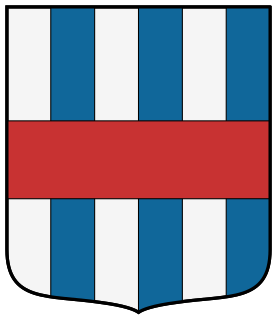
The Gundulić was a noble family of the Republic of Ragusa, considered one of the most prestigious families of the republic. It had origins in southern Dalmatia and Tyrol. The family´s motto is Tout ou rien.

The Ghetaldi was a noble family of the Republic of Ragusa.
Antun Sorkočević was a diplomat, writer, composer and member of Ragusan nobility. He was Medo Pucić's cousin, and a good friend of Marko Bruerović. He also held the position of Mayor of Dubrovnik during the French Empire.
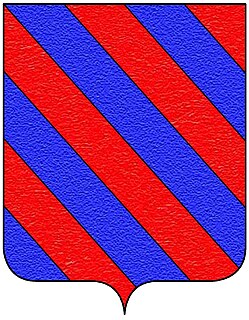
The Sorgo or Sorkočević were a noble family of the Republic of Ragusa.
Savino Bobali, nicknamed "the Deaf", was a Ragusan nobleman, politician and founder of the literary "Academy of Concords". He wrote poetry in Italian and also in Croatian.
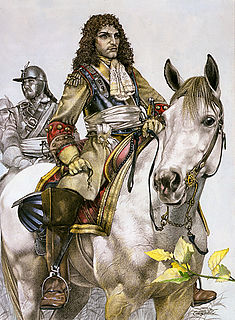
Count Frano Gondola, Frano Đivo Gundulić or Francesco Giovanni Gondola; was a nobleman from Dubrovnik, of the House of Gundulić.
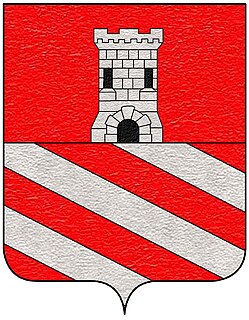
Menčetić was a noble family of the Republic of Ragusa in what is today Croatia.

Šišmundo (Šiško) Gundulić, also Sigismondo Gondola, was a nobleman and poet from the Republic of Ragusa. He was the son of poet Ivan Gundulić and Nika Sorkočević, and brother of the Austrian Marshal Fran Dživo Gundulić. He served as a Rector of the Republic of Ragusa (Dubrovnik).

Đivo (Ivan) Šiškov Gundulić, was a nobleman from the Republic of Ragusa, the son of Šišmundo (Šiško) Gundulić and Katarina Nale. He was the Rector of the Republic of Ragusa between 1696 and 1700. Following his father and his grandfather Ivan Gundulić, he also wrote poetry: Suze i tužbe Radmilove (1702), Radmio (1701), Oton (1707) and Filomena. He also composed diverse folklore songs, that have been preserved from generation to generation until today by the people of Dubrovnik.
Crnča is a village located in the Ljubovija municipality in western Serbia. The village had a population of 1,213 in 2002.
The Kaboga were a patrician family from the city of Dubrovnik and its Republic of Ragusa. Their numbers, economic power and social and political status marked them as wealthy, influential and noble. Originating in the eighth century, they are one of the oldest and best-known families in Dubrovnik. Many of its members were rector (knez) of the republic, and the Austrian Empire recognized its members in 1818 and 1833 as counts.

Bona, or Bunić, is a noble family long established in the city of Dubrovnik.

The Giorgi or Zorzi were a noble family of the Republic of Venice and the Republic of Ragusa.

Paladino Gondola was a Ragusan diplomat and merchant, a member of noble Gondola noble family.
The nobility of the Republic of Ragusa included patrician families, most of which originated from the City of Dubrovnik, and some coming from other, mostly neighbouring, countries.
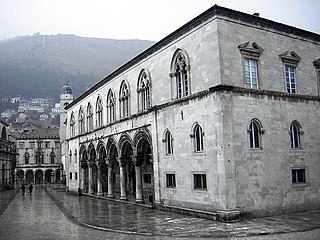
The rector was an official in the government of the Republic of Ragusa. The holder was the head of the executive powers of Ragusa, part of the Small Council. The rector was seated at the Rector's Palace.